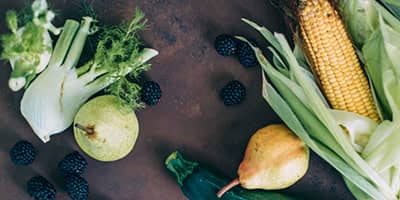
Alles zur Zutat Pflaume
Pflaume Rezepte
Entdecke unseren neuesten Kochrezepte für die Zutat "Pflaume". Noch mehr Rezepte findest du auf unserer Rezepte-Übersicht.
Zwetschgenknödel mit Haselnussbrösel Foto: SevenCooks
Foto: SevenCooks 500
500
 Foto: SevenCooks
Foto: SevenCooksZwetschgenknödel mit Haselnussbrösel
Mittel | 1,3 Std. | 638 kcal
Geflochtener Pflaumenkuchen Foto: SevenCooks
Foto: SevenCooks 199
199
 Foto: SevenCooks
Foto: SevenCooksGeflochtener Pflaumenkuchen
Einfach | 1,3 Std. | 332 kcal
Teilen:
45kcal2%
Brennwert
189kJ2%
Energie
86GRAMM3%
Wasser
0,6GRAMM0%
Eiweiß
0,2GRAMM0%
Fett
10GRAMM4%
Kohlenhydrate
1,7GRAMM0%
Ballaststoffe
0,5GRAMM0%
Minerale
1,3GRAMM0%
Säuren
0GRAMM0%
Alkohol
Pflaume enthält 189 kJ Brennwert bzw. 45 kcal Energie pro 100 g. Das deckt etwa 2,1 % des Tagesbedarfs. Zudem sind 0,6 g Eiweiß (0 % d. Tagesbedarfs), 0,17 g Fett (0 %) als auch 10,16 g Kohlenhydrate (3,8 %) enthalten.
Allergene
Fruktose
Fruktose
Fruktose (Fruchtzucker) ist ein Einfachzucker, der in unterschiedlich hoher Konzentration in vielen Lebensmitteln steckt. Zum Beispiel in Obst, Gemüse, aber auch Honig und Haushaltszucker. Mit diesem Icon weisen wir auf Lebensmittel im Rezept hin, welche einen Fruktoseanteil von über 2000 mg pro 100 g haben.Vitamine pro 100g
- Vitamin A-Retinoläquivalent61 µg
- Vitamin A-Beta-Carotin366 µg
- Vitamin E-Tocopheroläquivalent850 µg
- Vitamin E-Alpha-Tocopherol850 µg
- Vitamin K-Phyllochinon8 µg
- Vitamin B1-Thiamin72 µg
- Vitamin B2-Riboflavin43 µg
- Vitamin B3-Niacin, Nicotinsäure440 µg
- Vitamin B3-Niacinäquivalent440 µg
- Vitamin B5-Pantothensäure180 µg
- Vitamin B6-Pyridoxin45 µg
- Vitamin B9-gesamte Folsäure2 µg
- Vitamin C-Ascorbinsäure5400 µg
Mineralstoffe pro 100g
- Natrium2 mg
- Kalium161 mg
- Calcium8 mg
- Magnesium7 mg
- Phosphor16 mg
- Schwefel6 mg
- Chlorid2 mg
Spurenelemente pro 100g
- Eisen256 µg
- Zink83 µg
- Kupfer64 µg
- Mangan64 µg
- Fluorid2 µg
- Iodid1.4 µg


 Foto: SevenCooks
Foto: SevenCooks Foto: SevenCooks
Foto: SevenCooks Foto: SevenCooks
Foto: SevenCooks Foto: SevenCooks
Foto: SevenCooks